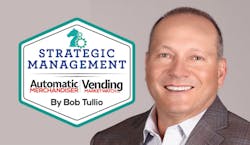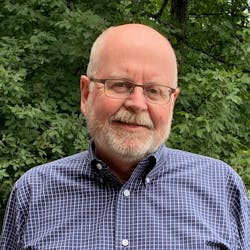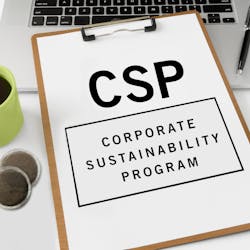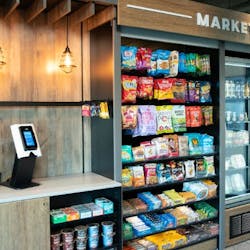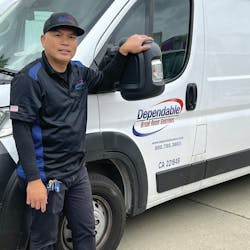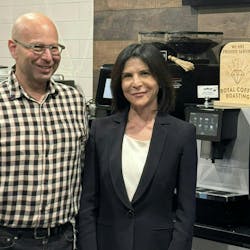Industry consultant Bob Tullio (www.tullioB2B.com) is a content specialist who advises operators in the convenience services industry on how to build a successful business from the ground up. As a recognized industry expert in business development and sales, NAMA has hired Tullio to write and narrate their new online course, “Selling Convenience Services,” to be released in early 2020. At the CTW show, Tullio will be a presenter at the Nov. 18 pre-conference session, “The Essence of Coffee,” with his portion of the program focusing on Sales Techniques and Storytelling. On December 10, 2019, 2:00 PM EST, Tullio will host a NAMA Sponsored Webinar, “Selling Convenience Services – How Management Support Creates Elite Sales Reps.”
Automatic Merchandiser asked Tullio to share his expertise on office coffee service (OCS), specifically, how operators can properly train and mobilize their sales team to cultivate relationships and increase sales. In the first of this two-part series, Tullio explains the fundamentals of sales, questions that salespeople should ask prospects and how OCS sales is different than other industries.
Q: What are the most important things to focus on to be successful in sales as an OCS operator?
A: Be ethical and supportive. There's a huge misconception about selling, that sales representatives have to be manipulative and self-serving. Because of that image, a lot of people cringe at the idea of selling a product or service. I think the philosophy has to be to sell the client what they need and what's best for them, instead of selling the client what you have on the shelf or what's going to make the deal most expediently. Ethical selling works in the long term, it creates trust and real relationships that result in more business down the line.
The other thing that has always worked for me — and it's what I teach — is using a solution-based approach. As a sales rep, you need to focus on critical questions:
· “Why am I here?”
· “What does the prospect really need from me that they're not getting?”
· “What are their objectives?”
· “What do they need to see to move forward with my company?”
When those questions are answered, a sales rep can focus on showing the prospect why their company is the right solution.
The essence of selling is, “You have a need, I have a solution, let's do business.” It's really that simple. The biggest problem out there — not just in convenience services, but in every industry — is that sales reps go in and give a presentation, but they don't ask the right questions.
Q: So listening to what the client needs is as important as asking critical questions?
A: Well, listening and getting the client to articulate what it takes to get the business. Focus on value-oriented solutions for customers — and solutions that are going to work for your company and the prospect — instead of saying, "OK, you're paying $40 a case, I'll give it to you for $38 a case." That price-based selling is just terrible for the industry. Instead, let's ask if that $40 a case product is really what they need. Let's show them a better way that maintains profitability for your company and at the same time gives the client a solution that they're looking for. And that's the difference between sellers and order takers.
I have a tremendous amount of respect for anyone who is selling convenience services because you've got the business development and lead generation portion of it. Some people get a lot of support from management, and some don't. Some are told, “Here's a phone, here's your kit, now go out and sell.” And that's pretty tough. Getting appointments is the real work."
When you get in front of a prospect, that's where the real opportunity is, and that's why I think it's critical for companies in convenience services to invest in teaching people how to be an elite sales rep and how to make the most of those opportunities when you get in front of a decision-maker.
I also think sales reps need to stick with fundamentals. LinkedIn is important, but we have all these "gurus" on LinkedIn that are trying to find shortcuts to selling. They're touting new ways to reach people, or to sell to people, without sticking to fundamentals. For sales reps, there are some fundamental things that need to be done. You need to offer choices to prospects. I used to hear my own salespeople say, "How about we meet at 3 p.m." Instead, you can say, "I'm available on Tuesday at 10 a.m. or Wednesday at 4 p.m. Which day and time is better for you?" Your likelihood of getting that appointment is much greater when you're offering a choice. These are the kinds of things that need to occur in selling that just don't always happen. And it makes a difference.
Q: So what are some of the other fundamentals of sales that you would recommend for OCS operators?
A: Basic things. Sending a calendar invite. Getting an appointment with a prospect is hard work; don't assume that your prospective customer is as organized as you are. You have to send a calendar invite that requests a reply and gets that appointment right into the prospect's schedule.
You need to be prepared by allocating enough time to learn about the company you're visiting. You've got to understand the corporate culture of your client. What is your initial strategy going to be based on the information that you currently have? Did you look up the contact's information on LinkedIn to see if you have any common connections? It's very easy to find all of this information. Doing the work – that is what separates the mediocre salesperson from the elite salesperson.
Q: How is OCS sales different than other industries?
There are a lot of moving parts. When you go into a location, you need to be able to look around the room and evaluate at least two things. Number one, what can I improve here that will increase value for the client and increase profitability for my company? And secondly, what opportunities are missing here? It requires a tremendous amount of product knowledge and industry knowledge, and you must be able to think on your feet.
You could walk into a location that has a coffee brewer and say, "OK, I'm going to sell coffee. What do you get? Six cases a month? And you get coffee, cream and sugar?"
Now you could sell that, or you could look around the room and say:
· "I noticed you have bottled water. If I could cut that cost considerably, would you be open to discussing it?”
· “I see that you're getting your beverages from a warehouse store and they're piled in the corner. Would you be open to solution that would organize that product and really upgrade the amenity?”
· “I see that you're getting a lot of your paper products from multiple sources. Can I take a few moments to tell you about how many of our clients save money and time by consolidating vendors?”
· “I see you've got 275 employees and your vending machines are looking pretty empty. Have you heard of a micro market?"
Every location that you step into has so many different variables. The mediocre sales rep goes in and sells based on what he sees there. The great salespeople — and we're trying to create elite salespeople — can think on their feet. With proper training, we can give reps the tools to turn a $400 a month account into a $2,500 a month account simply by giving the client what they really need - solutions, vendor consolidation and answers to their questions.
An insurance salesman will sell you your car insurance and he might suggest life insurance, but it's the same routine every time. Convenience services salespeople see so many different variables and supplier avenues that they have to try to figure out and so many different challenges every time they walk into a location. You never quite know what you're going to walk into, so you need to have some vision and an open mind.
Q: What's a misconception that OCS operators may have about how they should conduct sales?
A: I'm not sure if it's a misconception, but I think we try to duplicate services, and that's my concern. If someone says, “I really want a strong, full-bodied coffee,” and you look at the location and you see that their consumption levels do not match what they should be based on the number of employees, you have a choice. You could either say, "Here's what I can offer you for a strong full-bodied coffee.” Or, you could take another step and say, "May I make another suggestion? Could we do a coffee taste-test and see what the office staff feels they would really enjoy?"
There is a risk factor involved. Are you willing to dig a little deeper to find a solution that's going to be better for your company and better for them? When it is obvious that the client is opting for the wrong solution, the elite salespeople will help them make the right choices. If they don’t, in six months, the client will be just as unhappy with your company as they are today. Let’s provide the right products and services for their company the first time around.
